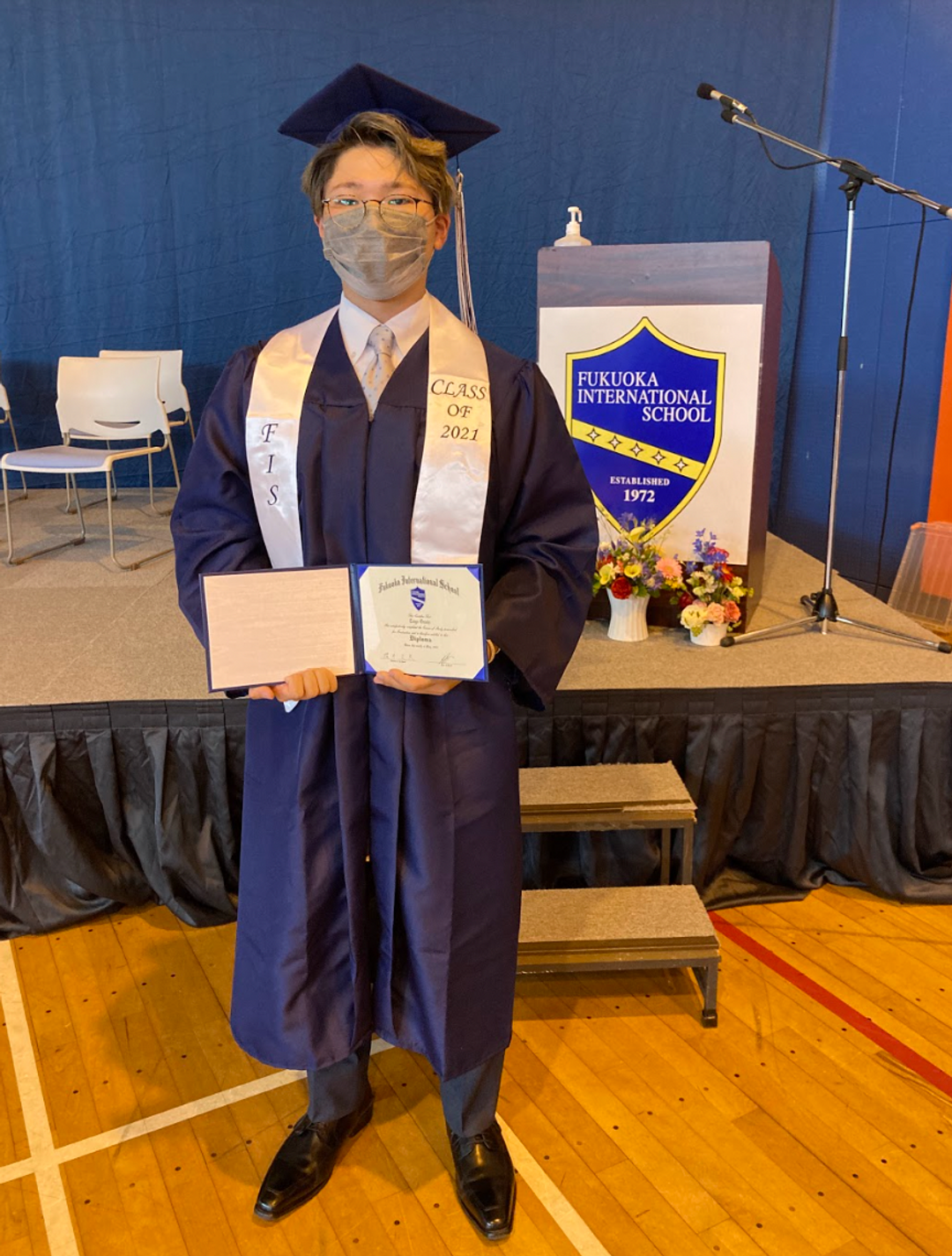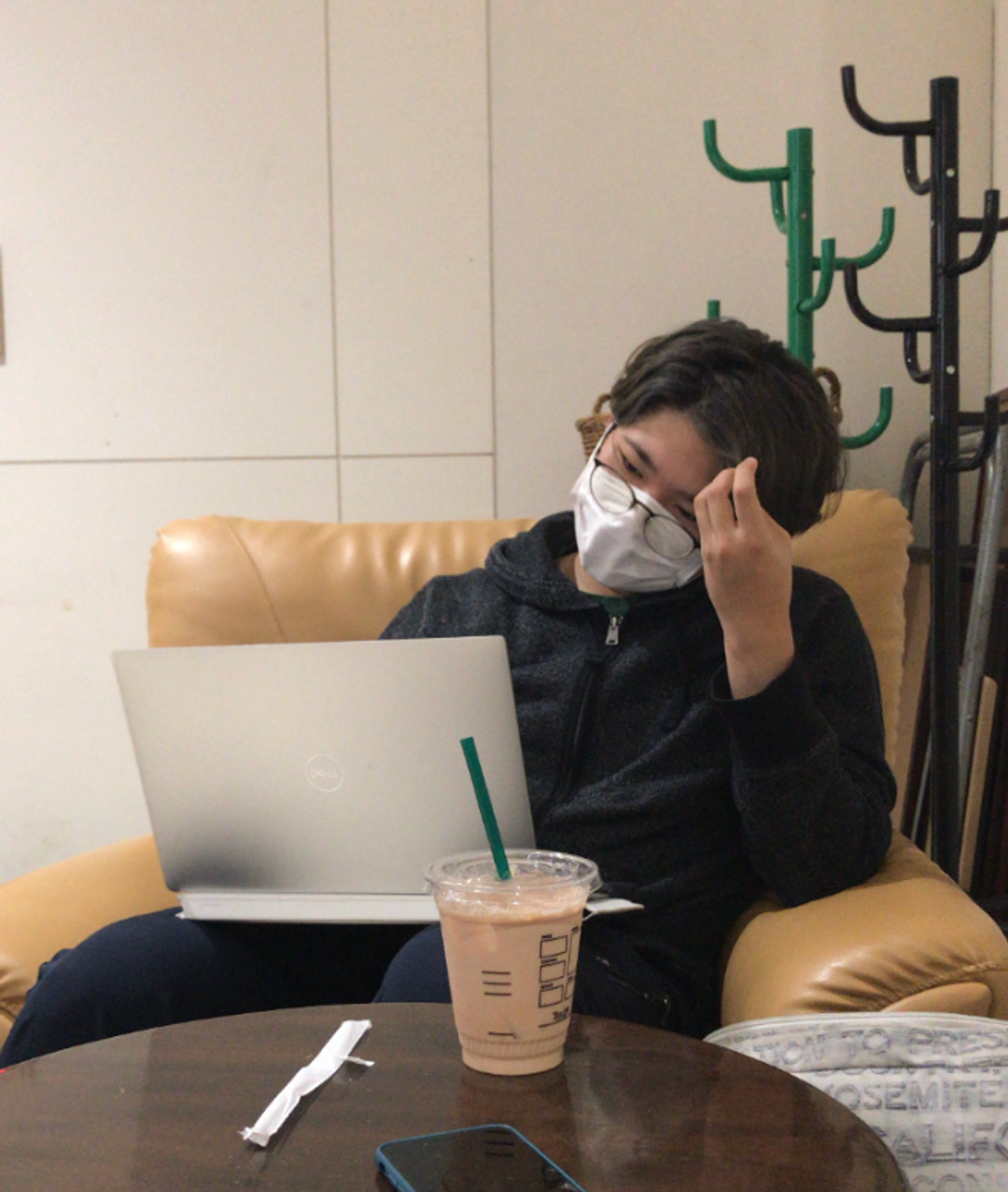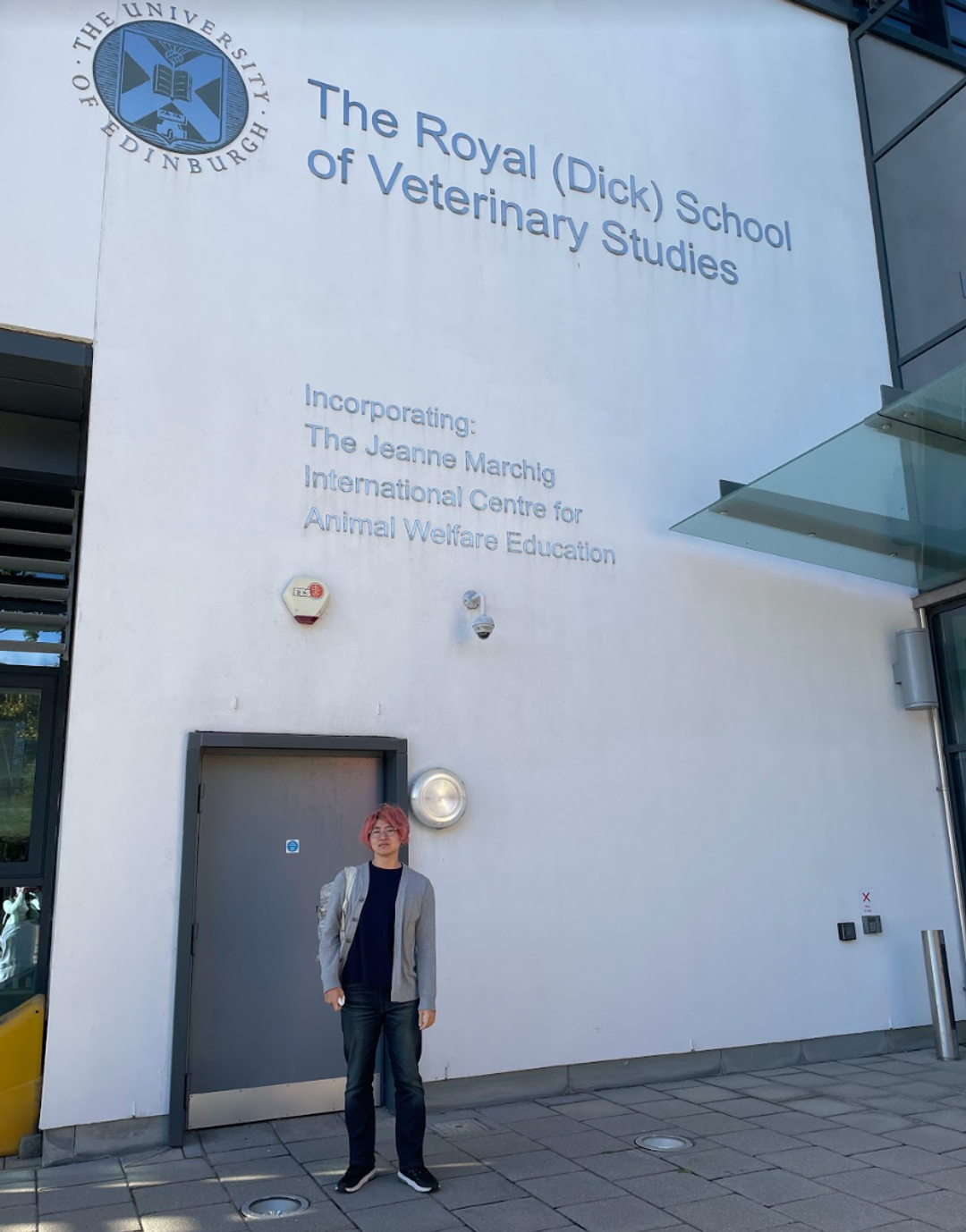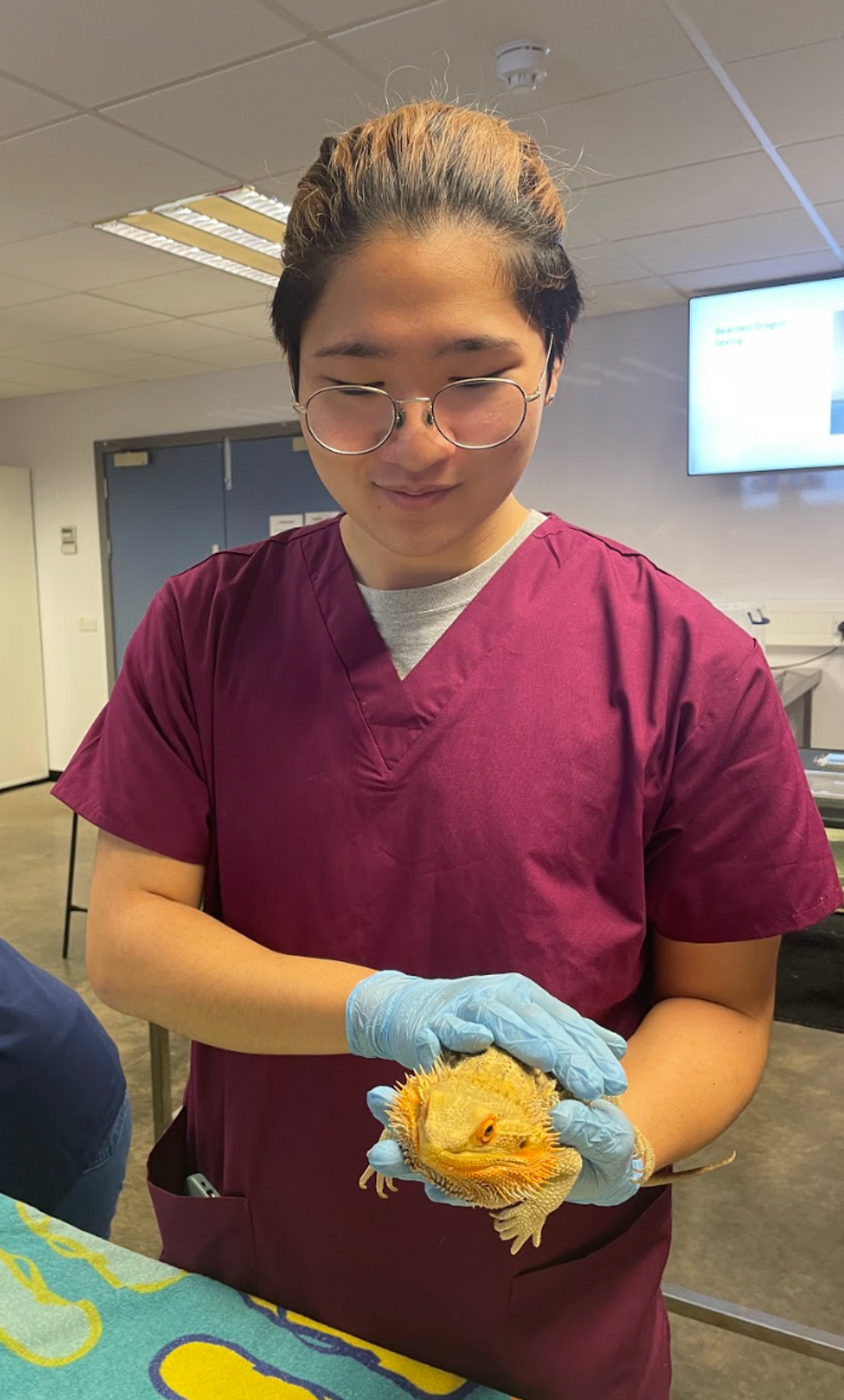Meet Taiga Onishi
Vet Student
Originally from Japan, Taiga Onishi is currently in his first year at The University of Edinburgh studying veterinary medicine. He hopes to one day work as a vet and contribute to wildlife conservation.
STEM to the Sky
Dec 4, 2022
- Were you always interested in STEM when you were younger?
- How did the International Baccalaureate (IB) program prepare you for university?
- Do you have any advice for students currently in the IB program?
- Why did you choose to attend Edinburgh University?
- How do you balance your work life and personal life?
- What is your biggest challenge in university right now?
- Do you have an all-time favorite subject or topic?
- Can you walk us through a typical day in your life?
- Do you have any book/resource recommendations?
- What are some of your future goals?
Were you always interested in STEM when you were younger?
My interest in veterinary medicine was somewhat broad when I was little, and still is today. I love animals of all kinds, especially my cat. Going into high school, I didn’t know what I wanted to do. My main interest was something animal related, but I didn’t know if I was going to be a vet since it’s a hard degree. So as a backup, I was thinking of zoological studies or animal behavior studies. Although I always had animals as a priority, I was also interested in other subjects such as international relations and politics.
How did the International Baccalaureate (IB) program prepare you for university?
Honestly, IB really does help with your first year, even being in such a demanding degree. Just knowing that you've been through two years of hardship gives you a really strong sense of confidence. It makes you feel like you deserve to be here.
The second part is that the academic requirements of IB were very high. Right now, we have several presentations to go through and essays to write, but having done that already in high school, I know how to reference everything, how to express myself, and how to format essays. Being experienced with literature skills from the early years of high school really does help coming to university. Even if it's not necessarily on the same topic (for my extended essay, I wrote on history instead of biology or chemistry), the general structure can be similar. The general essay writing skills are definitely transferable, and all of those really do help in university.

Graduating with IB Diploma from Fukoaka International School (Credit: Taiga Onishi)
Do you have any advice for students currently in the IB program?
Everyone has different strengths and means of studying, but if I could give universal advice to everyone, it would be to keep doing what you think works for you. If you're just starting IB, then I recommend you to explore different ways of studying. Try studying alone, studying with your buddy, studying through visuals, audio, reading, and writing. If you're artistic, go artistic.
Find a studying style that matches you, and once you find it, just stick to it. IB is more about continuous effort. You just have to keep going, and once you know your studying style (roughly), it just gets so much better.
"Find a studying style that matches you, and once you find it, just stick to it."
Taiga Onishi
Personally, I really enjoy working with people. I had a study buddy in IB who took the exact same subjects as me. We were pretty much studying together all the time. For me, that worked so nicely. It really helped me get through all the tasks and had a lot of emotional support aspects. Also, don't stress yourself too much as well. You can't always go full on and put 110% into everything. Just make sure to keep it balanced all the way through.

Exam studies at a cafe (Credit: Taiga Onishi)
Why did you choose to attend Edinburgh University?
I grew up in an international environment my entire life, and I speak Japanese and English. The first thought in my mind was that I wanted to go to some English-speaking universities so I wouldn't have to go through the hassle of learning a new language at the university. That left countries like Singapore, the US, or the UK.
I chose the UK especially because I wanted to get a degree that would help me work anywhere in the world, and the UK is one of the best places for biology and medicine-related degrees, including vet. You do probably have to retake a test for a country no matter where you go, but it adds credibility to your skills graduating from here (the UK). The best thing about getting a UK vet license is that it's actually applicable to some Commonwealth countries. Out of all the places where you can get a vet degree, I thought the UK would be the best option to broaden my perspective and to have different opportunities for me after I graduate.
"Out of all the places where you can get a vet degree, I thought the UK would be the best option to broaden my perspective and to have different opportunities for me after I graduate."
Taiga Onishi
The UK has ten different vet schools, and they're all really good. Specifically for Edinburgh, because of COVID, I didn't really have a chance to visit the campus or see the city, so I couldn't really decide upon that. But, my parents visited before, and I heard how good the city is from them. Edinburgh was ranked really high up there, and there were also some financial aspects as well (how much I can afford and the scholarships that were available). I actually didn't have many other options because I applied to four UK universities in total. I got into Edinburgh and got rejected by three other universities, which worked out well because Edinburgh was my top choice.
How do you balance your work life and personal life?
Time management can be really stressful. IB really helped with time management because you're constantly overloaded with so many upcoming assignments and assessments, and you just have to keep all of them in mind. Currently, in my first year at university, I'm still struggling to fully balance it out well.
Keeping a simple checklist really helps me. Right now with my exams approaching within a month, I just have a checklist of what to do first. I would often merge it with my calendar and timetable so I clearly know which tasks to do first and which tasks to expect coming up. You have to simply go one by one, rather than just overwhelming yourself with all of the tasks out there.
I’m doing a fairly good job at balancing work and life I’d say. Every Friday evening or every weekend, I at least try to make some time to socialize. I go out to a pub with my friends and have some drinks. Taking a break helps to keep up my motivation and to prevent myself from burning out.


The veterinary school at the University of Edinburgh (Credit: Taiga Onishi)
What is your biggest challenge in university right now?
My first semester was somewhat online because of COVID. I struggled to keep up with all of the online lectures—sometimes, my timetable would be filled with lectures from 9 AM to 5 PM. Keeping up with those lectures while doing your assignments and staying focused during an online lecture where you’re just sitting in front of a computer for eight or nine hours a day can be pretty tough.
Now, we're back to in-person teaching, so it does get a bit better. But, it can still be difficult. I'm currently writing an essay, which is due on Friday, and I still have four or five lectures tomorrow. Each lecture usually takes an hour, so I need to be on campus for five hours and focus on the lecture. At the same time, I need to get through all the lessons, which can really be tough.
Do you have an all-time favorite subject or topic?
We don't have the concept of a major or minor. We just have a vet degree and everything within it. What fascinated me the most was animal anatomy. I'm pretty sure that you would never have an opportunity to learn this in high school. I only learned some bits of muscle formation—the basic knowledge—in my high school’s IB program.
In university, you really go into much more depth. In the first week, we started dissecting a dog's head…straight up. It was shocking but also fascinating to be able to have that practical knowledge right as you start university. Having well-known professors teaching you, seeing it with your own eyes, and dealing with it with your own hands was really interesting.
"In the first week, we started dissecting a dog's head…straight up."
Taiga Onishi
Can you walk us through a typical day in your life?
My university campus is far off from the city and the accommodation that I'm staying in. Sometimes, I prefer to study in the morning, so I would sleep early and wake up early.
First semester, I would sometimes wake up at 5 AM, go to a library in the morning, study first, and then get on a bus at 8 AM. We always have a lecture at 9 AM. Tomorrow, I have a tutorial from 9-10 AM. I have three lectures coming up after, so I'll probably just stay on campus, studying between the lectures. I have a practical lesson again in the afternoon. Most of the time, it becomes a nine-to-five on campus, doing practicals and preparing for my next lecture. Then, I’ll be back in my dorm at around 6 PM.

Practical class (Credit: Taiga Onishi)
Do you have any book/resource recommendations?
In my free time, I would often watch simple documentaries about cats and felines like “Big Cats”. It was less academic for me, but more for just enjoying my time. Sometimes, I would just watch “Our Planet” on Netflix. Those documentaries about wildlife really did fascinate me. Rather than focusing on what's really “needed” or what is academic, in my opinion, the best thing to do is to watch what interests you the most and doesn't exhaust you. It should be something you can willingly do in your free time.
I didn't really read a lot of books, but if that is your passion, go for it. Find a fun book related to your passion. For aspiring vets, there are so many textbooks out there—stories written from a vet’s perspective, biographies about a vet’s life, etc. There’s a really famous show about a Scottish vet as well. There are so many resources out there, so find something that interests you and watch it in your free time. Keep yourself engaged and fascinated about it.
What are some of your future goals?
My goal coming into the vet school was to, obviously, graduate and be a vet. But, my ultimate goal is to work in the wildlife sector and be a part of wildlife conservation efforts and conduct research.
Right now, I’m a committee member for the Dick Vet Wildlife Conservation Society at Edinburgh. I have so many opportunities to attend seminars, webinars, and talks from well-known vets around the world who are currently working in wildlife conservation, which is what my passion is. It's mind-blowing to hear how much they're doing, how passionate all of them are, and how encouraging they are to students as well.
I'm not entirely sure which specific species I want to go into, but I'm planning to discover it as I go through the vet school because they teach you about every species. Broadly speaking from my personal preference and background, I, at the moment, wish to work in wildlife conservation research in a cold climate. Cold animals really do fascinate me: polar bears, penguins, and snow leopards. Snow leopards especially—they're so cute! That's a strong motivator for me.
It will obviously be hard and challenging, but I can tell myself with confidence that I’m very passionate about it. I will just keep on going and hope to one day be one of those vets in the field working with other vets and people from other professions towards the single goal of conserving wildlife.